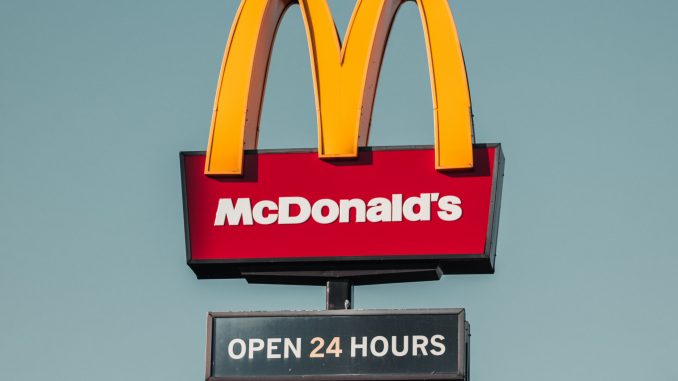
In the late night of March 1, I made a decision. It was one I thought was a semi-casual decision, but it turned out to be one that shifted my perspective of America. It was hours into a “Euphoria” marathon and I had the munchies, but the only food around was an uneaten double cheeseburger from McDonald’s.
Because it was the only option available, I swallowed my pride. And then the entire contents of the burger. It was honestly phenomenal — a truth that turned much of what I had been socialized to believe on its head. Maybe it was just because in the moment I was feeling particularly high, on life. But I was so surprised at how yummy the burger was.
Throughout middle and high school, I (like many students in America) watched countless videos warning us about the dangers and horrors of America’s fast food system, particularly McDonald’s. They had a really strong impact on me.
Readers, I know what you’re thinking. “Your first ever McDonald’s cheeseburger wasn’t until you were 21 years old?” Yes, it’s embarrassing. But, I was brainwashed.
We’re told that fast food is an unhealthy, unappetizing and entirely unuseful choice compared to healthier alternatives.
But McDonald’s also feeds the poor, the rushed and those who just want to satisfy some munchies. It’s also delicious, contrary to what many of those documentaries make it seem to be. In a nation where warm, nourishing food is often only afforded to those who have enough money to buy restaurant meals or the privilege of having housing they can cook in, you’d think the availability of an option that provides delicious and affordable food to those who can’t afford it would be glorified.
Instead, it’s demonized. Maybe it’s because McDonald’s is associated with the poor, maybe it’s because it’s a huge, powerful chain with lots of attention on it, but McDonald’s has received some potentially disproportionate backlash for unhealthy practices. Out of all of the unhealthy and immoral food businesses in America, people are proud to turn their noses up at the mere idea of McDonald’s.
The issue is not just health. It isn’t just taste. If it were, Wendy’s and Burger King would also be losing profits in recent years. But they aren’t.
In fact, in one experiment people were given McDonald’s food but told it was a more high end, more healthy alternative to McDonald’s. The food was plated fancily and formal chefs stood behind it. The people trying the allegedly more expensive and ethically sound version of McDonald’s said it was much better than McDonald’s. One person said, “It’s definitely a lot tastier than McDonald’s. You can just tell this is a lot more pure.”
The fact that pure is even a word used to describe food speaks volumes about how much we over-associate diet choices with morality.
McDonald’s and other fast food businesses’ natural counterparts are the “casual fast food” industry, which includes places like Chipotle and Panera Bread that promise fast, but more upscale and high quality foods. If America’s issue was just with the quality of McDonald’s food, then when McDonald’s menu offerings expanded to include more fresh and nutritious foods, its poor reputation would vanish. But yet it seems that it’s still more respected to get mac and cheese from Panera than it is to get a kale salad from McDonald’s.
Chris Muller, a chain restaurant expert at Boston University, says that the reason McDonald’s is shunned has to do with how millennials see the company. He said to Deseret News that millennials won’t frequent McDonald’s as much as other generations because they “watched ‘Super Size Me’ in school and were told that eating at McDonald’s is poison.” But in reality, it’s healthier than several other fast food restaurants in terms of calories.
But why is the calorie count of McDonald’s foods so important anyway? Why are some people embarrassed to admit how often they go to McDonald’s?
In our current “more-organic-than-thou” era, eating healthy food is tightly associated with being a good person. Being able to afford to buy from sustainable brands and eat cage-free, hormone-free beef is not just considered a benevolent and privileged choice—it’s considered being a good person.
This is a flawed ideology. Those who have the privilege to make these decisions can and should. But we should not allow capitalism to reduce our entire beings and moral compasses to how we choose to spend our money. That is only something those with a superfluous amount of money can freely choose; those with a big abundance of money represent the absolute minority of Americans.
In our brains’ attempts to process all of the information we are being forced to learn about the business practices of so many companies and health benefits of so many food systems, we jump to quick assumptions.
A person who frequents Karma Road is seen as a good, conscientious person. A person who frequents McDonald’s is seen as an ignorant, not so intelligent person.
Understanding the multiple systemic issues at play in America easily should allow for people to extend a greater appreciation for all that McDonald’s and other fast food places do. While they aren’t perfect, they provide some small solution to issues related to food insecurity, food price inflation, hunger and poverty across America. And they make a pretty fantastic $3.50 double cheeseburger & fries combo in the process.

